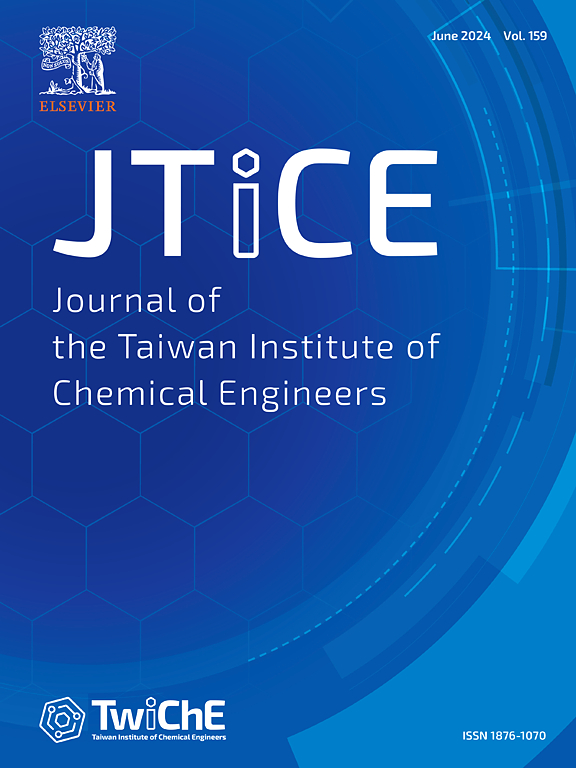Intermolecular dynamics and quantum insight of lithium perchlorate in the deep eutectic solvent (DES) solutions with nitriles for energy storage applications
IF 5.5
3区 工程技术
Q1 ENGINEERING, CHEMICAL
Journal of the Taiwan Institute of Chemical Engineers
Pub Date : 2025-03-06
DOI:10.1016/j.jtice.2025.106041
引用次数: 0
Abstract
Background
Deep eutectic solvents (DESs) in combination with lithium salts are evolving as promising alternative electrolytes for energy storage applications. However, to efficiently develop, produce, and improve DES-based electrolytes, a thorough understanding of the various interactions involved, is essential for elucidating the intermolecular dynamics among all components in the systems.
Methods
We used a combination of experimental thermodynamic techniques, including density and speed of sound measurements, to investigate the physicochemical properties of ethaline DESs with nitriles (acetonitrile and succinonitrile) and lithium salt (LiClO4). Electrochemical stability, conductivity, and FTIR spectroscopy were employed to explore electrochemical properties and molecular interactions. Computational studies, including optimized structure calculations, interaction energy analysis, and reduced density gradient (RDG) studies, were performed to assess the stability and bonding interactions in these systems.
Significant findings
Our results reveal strong solute-solvent interactions, particularly with increasing LiClO4 and nitrile concentrations. Temperature derivatives showed that LiClO4 influences solution structure, acting as a disruptor. FTIR analysis confirmed key hydrogen bonding interactions. Electrochemical studies demonstrated enhanced conductivity, while computational studies supported the observed stability and interaction energies. RDG and density of states (DOS) analysis further confirmed the hydrogen bonding and the stability of the complexes formed in these systems.

高氯酸锂在深层共晶溶剂(DES)与腈溶液中的分子间动力学和量子洞察
深共晶溶剂(DESs)与锂盐的结合正在发展成为储能应用的有前途的替代电解质。然而,为了有效地开发、生产和改进基于des的电解质,对所涉及的各种相互作用的透彻理解对于阐明系统中所有组分之间的分子间动力学至关重要。方法采用密度和声速测量相结合的实验热力学技术,研究了含乙腈、丁二腈和锂盐(LiClO4)的乙炔脱氢醚的物理化学性质。利用电化学稳定性、电导率和FTIR光谱研究其电化学性质和分子相互作用。计算研究包括优化结构计算、相互作用能分析和降低密度梯度(RDG)研究,以评估这些体系的稳定性和键合相互作用。sour结果显示了强的溶质-溶剂相互作用,特别是随着LiClO4和腈浓度的增加。温度衍生物表明,LiClO4会影响溶液结构,起到干扰物的作用。FTIR分析证实了关键的氢键相互作用。电化学研究表明电导率增强,而计算研究支持观察到的稳定性和相互作用能。RDG和态密度(DOS)分析进一步证实了在这些体系中形成的配合物的氢键和稳定性。
本文章由计算机程序翻译,如有差异,请以英文原文为准。
求助全文
约1分钟内获得全文
求助全文
来源期刊
CiteScore
9.10
自引率
14.00%
发文量
362
审稿时长
35 days
期刊介绍:
Journal of the Taiwan Institute of Chemical Engineers (formerly known as Journal of the Chinese Institute of Chemical Engineers) publishes original works, from fundamental principles to practical applications, in the broad field of chemical engineering with special focus on three aspects: Chemical and Biomolecular Science and Technology, Energy and Environmental Science and Technology, and Materials Science and Technology. Authors should choose for their manuscript an appropriate aspect section and a few related classifications when submitting to the journal online.

 求助内容:
求助内容: 应助结果提醒方式:
应助结果提醒方式:


